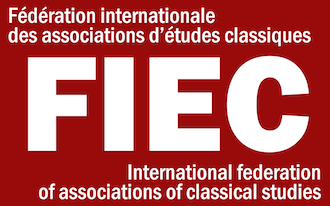This week we
would like to make you aware of a fully-funded, 4 year PhD Fellowship in Greek / Byzantine Studies (Database of
Byzantine Book Epigrams) which is offered by the University of Ghent. Please
note that the deadline for applications is the 7th of July 2016. You
may read the full job description below:
Within the
framework of "Poetry from the Margins: Literary,
linguistic, philological and cultural-historical analysis of a new corpus of
Byzantine book epigrams (800-1453)", a research project closely connected with the Database of Byzantine Book Epigrams, the Greek Section of the Department of Literary Studies at Ghent University (Belgium)
is seeking well-qualified applicants for a fully-funded and full-time doctoral
research fellowship (four years). The successful applicant will be part of an
international team of pre- and postdoctoral scholars and is expected to work on
the literary analysis and/or editing of selected book epigrams (metrical
paratexts in Byzantine manuscripts). (S)he will be supervised by project
director Professor Kristoffel Demoen and start employment between 1 October
2016 and 1 January 2017.
Envisaged
profile
The
successful candidate will have
- an MA degree in Classical Studies (with an emphasis on Greek) or Byzantine Studies;
- excellent knowledge of ancient Greek;
- good notions of medieval Greek (at the least);
- very good grades (including BA and MA dissertations of high quality);
- good knowledge of ancient and medieval Greek literary history;
- an interest in literary and/or cultural history, as evidenced by her/his study trajectory (e.g. optional courses, subject of papers and dissertations, etc.);
- the willingness to attend training courses in Greek paleography, codicology, textual criticism and/or book history (if these skills have not been acquired previously).
In order to
be eligible, candidates must have obtained their MA degree at the time of
application or demonstrate convincingly that they will have their degree in
hand by 1 October 2016.
We offer
- a four-year contract of full-time employment as a PhD student, continuation being subject to positive evaluation after one year;
- a competitive salary in accordance with the salary scales for PhD students as established by the Flemish government (c. €1,900 net monthly);
- a substantial allowance for travel and other research purposes in addition to this salary;
- office space at the Faculty of Arts and Philosophy, full membership of both the Department of Literary Studies and theDatabase of Byzantine Book Epigrams research team, and a solid and engaging academic working environment with a strong international profile;
- the possibility to acquire transferable skills as part of a Doctoral School programme.
The Poetry
from the Margins project resonates with the interests of a number of other
scholars at Ghent University and the successful candidate will be able to
interact with them as well as with students affiliated with various departments
and research institutes at the Faculty of Arts and Philosophy, such as
said Department of Literary Studies, the Department of Linguistics, the Department of History, the Ghent Institute for Classical Studies, and the Pirenne Institute for Medieval Studies.
We expect
that the successful applicant
- will write and successfully defend a PhD dissertation within the four years of the fellowship;
- will contribute to the strong research tradition of the Department and the University by pursuing excellence in her/his research and publishing her/his results in peer-reviewed journals and with academic publishers that are internationally accepted as being of the highest quality;
- will come and live in Belgium, work closely together with the other team members, and contribute to a pleasant and stimulating atmosphere;
- will actively contribute to the scholarly activities of the research group (e.g. by organising events in collaboration with the other members of the team).
How to
apply?
(a)
Applications should include
- a brief autobiographical statement (no more than one page) highlighting why the applicant is interested in this project and what added value (s)he expects to bring;
- a full curriculum vitae (including accurate information on obtained grades);
- relevant writing samples such as papers, a BA or MA dissertation.
(b) In
addition, we kindly ask candidates to arrange for two letters of reference to
be sent directly by the referees tokristoffel.demoen@ugent.be.
Deadline
Applications
(both a and b) should arrive no later than 7 July 2016.
Candidates
will get a notification of the outcome of their application within a week after
this date. Up to three candidates will be shortlisted. They will be asked to
write a concise research proposal and will be invited for a job interview
(either in Ghent or through videoconference) in August.
Please
direct any queries to kristoffel.demoen@ugent.be. A summary of the overall project is
available upon request.
Ghent
University offers professional support for those applying to the many funding
schemes at local, regional and European levels.
Ghent is an
attractive medieval city, with a strong economic base and lively cultural
scene. Just thirty minutes by train from Brussels, two hours from Paris and
Amsterdam and two and a half hours from London, it is ideally situated at the
heart of European intellectual life.
